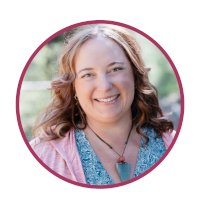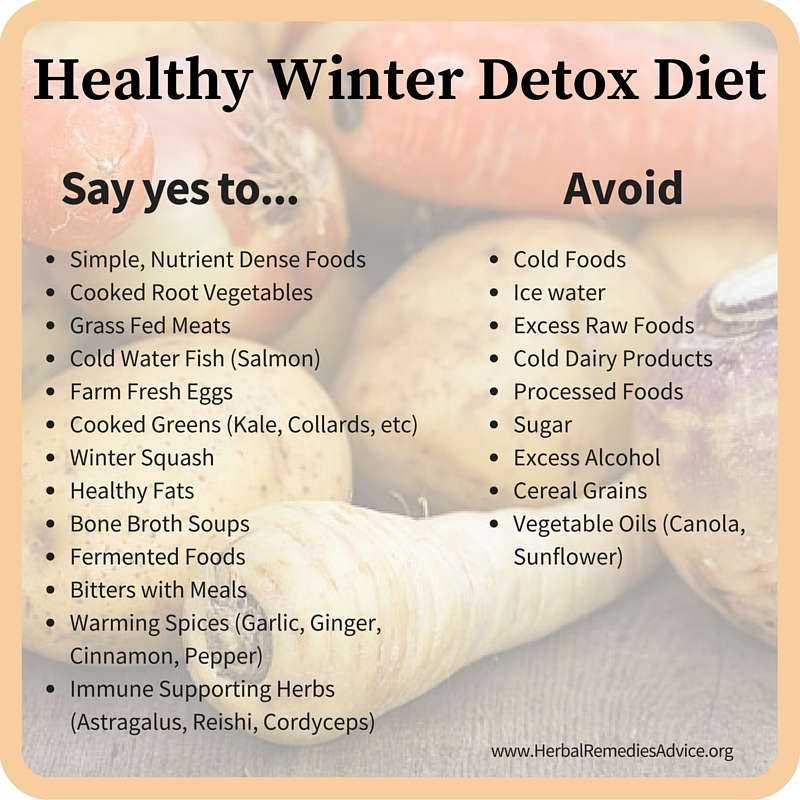Get weekly tips, recipes, and my Herbal Jumpstart e-course! Sign up for free today.

Winter Detox Diet
Share this! |
|
|
Yesterday while searching for something on the internet I came across a banner that read, “The party is over, now it’s time for a cleanse.” And it does seem that January is the month that people atone for the overindulgences of the holidays by doing a winter detox diet. Unfortunately, many of the “cleanse” programs or detox diet protocols are based on poor fad advice or, even worse, on letting some mega corporation get rich by playing on your guilty conscience. |
I’ve already written about why I don’t like most liver detoxes. These are generally one-size-fits all (which doesn’t benefit most), are harshly purgative, and give the idea that living in a health roller coaster of over-indulgence followed by strict penance is somehow healthy.
But in this article I want to specifically look at how a typical cleanse diet is not ideal for the colder winter months, as well as the best approach for a winter detox diet.
Keep in mind that I can only give general suggestions for healthy winter living here. Your particular health situation may need a variation of these suggestions.
Signs You May Benefit from a Winter Detox Diet
- You tend to feel cold, especially in your hands and feet
- You skin is dry.
- You have frequent bloating after meals.
- You are easily constipated or have slow transit time.
- You feel tired during the day.
- You have low energy.
- You are interested in natural health and want to feel your best.
Living With the Seasons
A major health tenet of herbalism is living with the seasons. This basic principle means that, as the seasons change, the foods we eat, the herbs we use, and the way we live our lives should change too. The goal is to be in balance with the forces of nature.
Many of us do this even on an unconscious level. We crave watermelon and iced lemonade on hot summer days and relish hearty stews during the cold winter months.
Winter is the time of rest and nourishment. Especially for those of us living in cold climates, winter is a time to recharge our energy stores in preparation for the busy months ahead.
Ways to live with the seasons in the winter include sleeping more, spending more time in introspection, and eating warming and nutrient-dense foods.
Many of the pervasive January penance detox diet revolve around eating cold raw foods like salads (or, worse, juices), exercising strenuously and taking cold eliminating herbs.
These practices are the exact opposite of seasonal living.
But I am not writing this article to be the Grinch that stole January’s health resolutions! There are many ways to support your health using a winter detox diet.
7 Steps to a Winter Detox Diet
1. Eat Simple, Nutrient-Dense Winter Foods
The winter months are the time of nourishment and restoration. If you feel cold, have low energy and dry skin these can be signs that you would benefit from simple, nutrient-dense foods including healthy fats.
Examples of this include
- Root vegetables (beets especially are important for liver health - a main detox organ)
- Healthy fats such as coconut oil, olive oil and rendered tallow and lard from grass-fed animals.
- Bone broth based soups
- Grass-fed meats
- Farm-raised eggs
This version of Tom Kha is a hearty soup with warming spices.
Our Sunday tradition is a spicy paprika chicken, our own take on Buffalo wings.
2. Do a Sugar Detox
One of the best things you can do for your health is to avoid sugar altogether. If you regularly eat sugar, consider spending some time in these later winter months to find ways to tickle your sweet tooth without giving in to the white death.
Try some stewed fruits or compotes or enjoy homemade dark chocolate.
Many people do a sugar detox and avoid sugar for the month of January in an attempt to atone for the rampant sugar consumption that started around Halloween and didn’t end until after the New Year.
But from a health perspective it doesn’t really work like that. Doing a sugar detox in January because you ate it in excess in earlier months doesn’t erase the damage the sugar has already done. It is far better to develop a new relationship with this white powder and learn how to enjoy your every day life (even the holidays) without sugar.
3. Go Grain Free
If you are really wanting to do some sort of fast for the winter months consider doing a grain fast. Rather than starving yourself of nutrients, a grain fast simply removes a potentially unhealthy food from your diet, leaving more room for nutrient-dense foods like vegetables, cold water fish and grass-fed meats.
Gluten intolerance is a rapidly growing problem among our population and many people are very surprised to see how great they feel when they cut out this food from their diet.
Does going grain free seem too overwhelming for you? In the least you might consider learning how to ferment your grains to transform the anti-nutrients inherent in grains.
4. Use Warming and Immune-Supporting Herbs
As an herbalist at heart I couldn’t have a list of healthy practices without including herbs.
Since the goal of a winter detox diet is to live in harmony with the seasons, winter months are all about warming chai teas, spicy soups and herbs that help to nourish and sustain your energy.
One of my most frequent teas in the winter is an Astragalus Chai Tea that is both warming and immune supportive.
5. Have “Bitters” with Meals
Bitter herbs and foods are a necessary part of healthy digestion! Living a life without bitters puts a wrench in your wheels of digestion. And, if you’ve been reading my articles, you’ll know that digestion is a major component of health.
Everyone can benefit from a bit of bitters. If you have a lot of bloating, difficulty digesting fats, constipation or slow transit time then bitters will be especially helpful.
To get the benefits from bitters you can eat mildly bitter foods like Brussels sprouts or raddichio. Or you can use a well balanced bitters blend like this one just before meals.
6. Limit Screen Time
A detox diet is not just about the foods we do or don’t eat but also about how we live our life.
Are screens taking over your life?
We use screens for work, for entertainment, to connect with friends and family, for directions and, for some, their smart phone becomes a constant companion that needs to be checked every 13.5 seconds.
If you feel like screens are taking over your life, consider limiting the extraneous time you spend with your screens.
If you’re unhappy with your own screen time, make a concerted effort to push the power off button and replace that time with something you love. Start a new hobby, dust off your guitar, join a book club, volunteer your time, journal, make more dates with friends or write letters (yes by hand) to loved ones.
7. Exercise that Makes You Feel Good
Going back to seasonal living, January is not necessarily the best time to start a new strenuous workout schedule. We are still in the months of rest and relaxation.
However, winter months shouldn’t be an excuse for being sedentary.
I encourage you to really check in with yourself and do the types of exercise that make you feel good this time of year, not the type you “should” do to “start the year right”.
If you work at a desk job or spend a lot of your day sitting, then getting more regular movement into your life can be even more health supporting than working your butt off at the gym for an hour at lunch.
That’s right, even if you get your hour of exercise a day, your health is suffering if you still spend most of your day sitting.
Gentle exercise like walking and yoga can be an important part of your detox diet. These types of movements help to move lymph (an important part of your body’s detox abilities.)
Summary
The start of the new calendar year carries a lot of momentum for creating new healthy habits. However, many of the popular cleanses being promoted right now are nothing more than fads lacking in any real health merits.
If you are interested in natural health then a great place to start is living with the seasons. Winter is a time of rest and nourishment, not a time of elimination and purging. The best detox diet for the winter months, especially for those in cold climates, are about hearty nourishing foods and delicious warming spices.

Rosalee is an herbalist and author of the bestselling book Alchemy of Herbs: Transform Everyday Ingredients Into Foods & Remedies That Healand co-author of the bestselling book Wild Remedies: How to Forage Healing Foods and Craft Your Own Herbal Medicine. She's a registered herbalist with the American Herbalist Guild and has taught thousands of students through her online courses. Read about how Rosalee went from having a terminal illness to being a bestselling author in her full story here.

